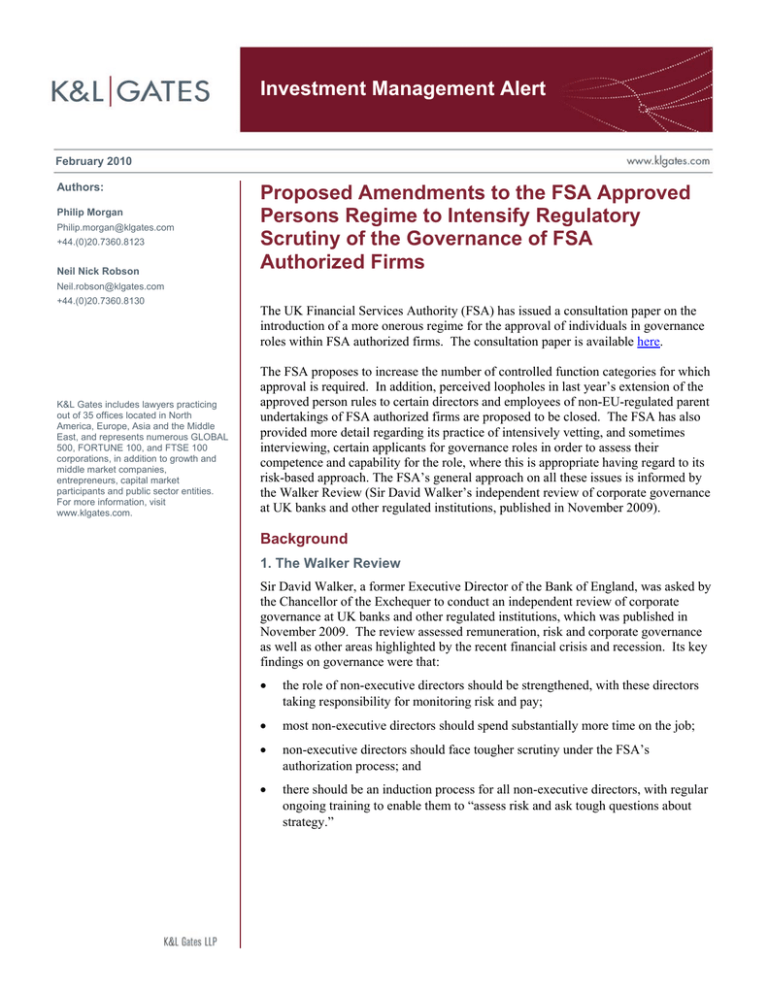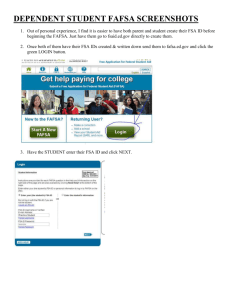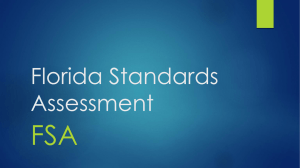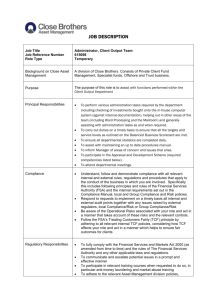
Investment Management Alert
February 2010
Authors:
Philip Morgan
Philip.morgan@klgates.com
+44.(0)20.7360.8123
Neil Nick Robson
Proposed Amendments to the FSA Approved
Persons Regime to Intensify Regulatory
Scrutiny of the Governance of FSA
Authorized Firms
Neil.robson@klgates.com
+44.(0)20.7360.8130
The UK Financial Services Authority (FSA) has issued a consultation paper on the
introduction of a more onerous regime for the approval of individuals in governance
roles within FSA authorized firms. The consultation paper is available here.
K&L Gates includes lawyers practicing
out of 35 offices located in North
America, Europe, Asia and the Middle
East, and represents numerous GLOBAL
500, FORTUNE 100, and FTSE 100
corporations, in addition to growth and
middle market companies,
entrepreneurs, capital market
participants and public sector entities.
For more information, visit
www.klgates.com.
The FSA proposes to increase the number of controlled function categories for which
approval is required. In addition, perceived loopholes in last year’s extension of the
approved person rules to certain directors and employees of non-EU-regulated parent
undertakings of FSA authorized firms are proposed to be closed. The FSA has also
provided more detail regarding its practice of intensively vetting, and sometimes
interviewing, certain applicants for governance roles in order to assess their
competence and capability for the role, where this is appropriate having regard to its
risk-based approach. The FSA’s general approach on all these issues is informed by
the Walker Review (Sir David Walker’s independent review of corporate governance
at UK banks and other regulated institutions, published in November 2009).
Background
1. The Walker Review
Sir David Walker, a former Executive Director of the Bank of England, was asked by
the Chancellor of the Exchequer to conduct an independent review of corporate
governance at UK banks and other regulated institutions, which was published in
November 2009. The review assessed remuneration, risk and corporate governance
as well as other areas highlighted by the recent financial crisis and recession. Its key
findings on governance were that:
•
the role of non-executive directors should be strengthened, with these directors
taking responsibility for monitoring risk and pay;
•
most non-executive directors should spend substantially more time on the job;
•
non-executive directors should face tougher scrutiny under the FSA’s
authorization process; and
•
there should be an induction process for all non-executive directors, with regular
ongoing training to enable them to “assess risk and ask tough questions about
strategy.”
Investment Management Alert
2. The FSA Approved Persons Rules
Under the UK’s Financial Services and Markets Act
2000, persons performing certain functions (known
as “controlled functions”) for FSA-authorized firms
in relation to their regulated activities are required to
be approved by the FSA. Controlled functions fall
into three broad categories relating to (1) the
exercise of a significant influence on the conduct of
the firm’s affairs; (2) dealing with the firm’s
customers; and (3) dealing with the property of
customers. To approve a particular person, the FSA
needs to be satisfied that he is a fit and proper person
to perform the function to which the application
relates. If he is not deemed fit and proper, the FSA
will refuse to grant him approval. As a result of
being an approved person, an individual is, among
other things, subject to the FSA’s Statements of
Principle and Code of Practice for Approved
Persons.
3. Consultation Paper Highlights
3.1 Proposed New Governing Functions
The FSA proposes five additional governing
functions relevant to non-executive directors (NED)
in FSA-authorized firms (chairman, senior
independent director, chairman of risk committee,
chairman of audit committee and chairman of
remuneration committee (CF2a-e)). As a result, for
example, a CF2 (non-executive director function)approved NED proposed for appointment as
chairman of the remuneration committee would need
to apply for an additional FSA approval as CF2e.
The FSA also proposes reinstatement of approvals
for persons who fulfill the finance (CF13), risk
(CF14) and internal audit (CF15) functions, all of
which were merged into CF28 (systems and
controls) as part of Handbook simplification in
2007. The rule that currently exempts individuals
who are approved under a governing function (e.g.,
director or non-executive director) from applying
separately for CF28 is proposed to be abolished in
relation to persons who fulfill the functions specified
in CF13, 14 and 15. The purpose of these proposals
is to allow the FSA “to segregate and capture
specific key roles within governance structures” –
and, if necessary, to prevent people taking on roles
for which they are not competent.
3.2 Proposed Extended Requirement for
Parent Entity Individuals to become FSA
Approved Persons
New rules were introduced on August 6, 2009 that
extended the approved persons regime (and,
therefore, the requirement to become individually
approved by the FSA) to individuals who were
likely to exert significant influence over a regulated
firm from a position in that firm’s holding company
or parent undertaking. Specifically, the new rules
extended the definition of the CF1 (director
function) and CF2 (non-executive director function)
designations to include directors, partners, officers,
members (in the case of limited liability
partnerships (LLPs)), senior managers and
employees of a non-EU regulated parent
undertaking or holding company of an FSAauthorized firm if their decisions or actions are
regularly taken into account by the governing body
of the FSA authorized firm, as we reported in our
client alert dated September 14, 2009 (click here).
Those new rules have attracted considerable
attention and comment, in particular because they
extend the reach of the FSA’s jurisdiction to a
greater number of individuals outside the UK than
was formerly the case.
The new rules do, however, contain some
exclusions so that, in particular, the CF1 and CF2
changes do not apply to FSA-authorized firms that
are partnerships (except LLPs) and other non-body
corporates or to cases where the parent undertaking
is itself an FSA-authorized firm, and the CF1
changes also do not apply to FSA authorized firms
that are LLPs.
The FSA now proposes to close perceived loopholes
in this area by reversing the changes to CF1 and
CF2 and creating a further new controlled function,
CF00 (parent entity significant influence function),
the terms of which closely follow the August 6,
2009 extensions to CF1 and CF2 but with all the
exclusions mentioned above removed. The effect of
this change would be that all directors, partners,
officers, members (in the case of LLPs), senior
management and employees of parent undertakings
of all FSA-authorized firms would need to apply for
and become FSA-approved persons if their
decisions, or actions, are regularly taken into
account by the governing body of the relevant FSAFebruary 2010
2
Investment Management Alert
authorized firm, unless the parent undertaking is EU
(but not FSA)-regulated or there is no arrangement
in place permitting the provision of the relevant
services to the FSA-authorized firm. U.S.
investment managers with UK LLP subsidiaries,
who will be one group directly affected by this
proposed extension of the rules, would need to give
this matter careful consideration if the proposals are
implemented as currently envisaged.
3.3 More Intrusive FSA Approach to
Approving and Supervising Individuals in
Significant Influence Functions
While emphasizing the responsibility on FSAauthorized firms to carry out their own thorough
assessment of an individual’s fitness and propriety,
the FSA is also intensifying its own supervisory
approach. Following its “Dear CEO” letter in
October 2009 (click here), the FSA has now
commented further on the intensification of its
assessment of the competence and capability of
applicants for significant influence functions (“SIF”)
in FSA-authorized firms. The FSA expects that, in
addition to normal recruitment process due diligence
(such as taking up references), firms will, where
appropriate, specifically assess the competence of a
candidate, identify any action to be taken postappointment to address any training needs, and
supply information on these matters to the FSA as
part of the approval process. For its part, the FSA
has offered, in appropriate cases and upon the
request of an FSA-authorized firm, to carry out due
diligence checks that the firm could not itself
conduct – for example, checks with overseas
regulators.
Developing the themes in the “Dear CEO” letter
referenced above, the FSA states that it will
“actively consider” the need to interview candidates
applying for any of the following roles in larger,
more complex or risky firms: chairman, chief
executive, senior independent director, finance
director, risk director, and non-executive directors
with responsibilities including chair of audit, risk or
remuneration committees. It may also interview any
SIF applicant where it has concerns. Statistics
released by the FSA with the consultation paper
show that 25 out of 332 candidates interviewed
during 2009 have subsequently withdrawn their
applications. The consultation paper, however,
makes clear that the intention is not to deter strong
candidates from pursuing senior approved person
roles in firms. Graeme Ashley-Fenn, the FSA’s
director of permissions, decisions and reporting,
said that “… with a strong and effective board,
everything else flows from that.”
3.4 Compromise Agreements
The FSA intends to clarify its understanding that,
notwithstanding any confidentiality agreement
between an FSA-authorized firm and an employee,
for example, in a compromise (or settlement)
agreement, the firm must disclose any information
to the FSA that may affect the FSA’s assessment of
an individual’s fitness and propriety – such as where
an individual is suspected of doing something that
may result in dismissal. The FSA also intends to
clarify that it considers the same principle to apply
to references for ex-employees.
3.5 Non-Executive Directors
The FSA has set out its expectations of nonexecutive directors at FSA-authorized firms, which
the FSA previously consulted on in 2008 but
deferred reporting on pending the outcome of the
Walker Review. In keeping with the Walker
Review’s conclusions, the FSA proposes, among
other things, that, in assessing an individual’s
fitness and propriety for a NED role, the FSA
consider the extent to which the individual is
capable of meeting the level of time commitment
that the firm has specified in its contractual terms of
appointment for the role.
3.6 Proposed Further Consultations
A further consultation during the first quarter of
2010 is expected to propose another new controlled
function category, for individuals responsible for a
firm’s protection of clients’ assets and money. At a
time to be determined, a second additional new
controlled function category, Business Resolution
Officer, will be considered.
4. Transitional Provisions
The new controlled functions will come into effect
for new applications after the FSA makes the rules
referred to in the consultation paper. The FSA
proposes that, with one exception, it will not require
FSA-approved individuals to seek explicit approval
for roles that they are already performing within
their existing approvals. Instead, the FSA proposes
February 2010
3
Investment Management Alert
that firms will be asked to notify the FSA of the
revised CF categories relevant to existing FSAapproved persons and that approval under the
revised CF categories will then be automatic. The
FSA has, however, stated that it will assess
competence of approved persons on an ongoing
basis as part of its supervisory approach. However,
the FSA is proposing to require individuals who
currently hold a governing function approval to
make new applications for any of CF13, CF14 or
CF15 under the new regime with a transitional
period of between three and twelve months,
depending on the size of firm. In relation to CF00, it
appears that the proposal is for a six month
transitional period for the approval of applications
from anyone who is not already an approved person
at the time the new rules come into force.
5. Timing
The consultation period closes on April 28, 2010 and
the FSA hopes that the new rules arising from the
consultation will be in place during the third quarter
of 2010.
Anchorage Austin Beijing Berlin Boston Charlotte Chicago Dallas Dubai Fort Worth Frankfurt Harrisburg Hong Kong London
Los Angeles Miami Moscow Newark New York Orange County Palo Alto Paris Pittsburgh Portland Raleigh Research Triangle Park
San Diego San Francisco Seattle Shanghai Singapore Spokane/Coeur d’Alene Taipei Tokyo Washington, D.C.
K&L Gates includes lawyers practicing out of 35 offices located in North America, Europe, Asia and the Middle East, and represents numerous
GLOBAL 500, FORTUNE 100, and FTSE 100 corporations, in addition to growth and middle market companies, entrepreneurs, capital market
participants and public sector entities. For more information, visit www.klgates.com.
K&L Gates is comprised of multiple affiliated entities: a limited liability partnership with the full name K&L Gates LLP qualified in Delaware and
maintaining offices throughout the United States, in Berlin and Frankfurt, Germany, in Beijing (K&L Gates LLP Beijing Representative Office), in
Dubai, U.A.E., in Shanghai (K&L Gates LLP Shanghai Representative Office), in Tokyo, and in Singapore; a limited liability partnership (also named
K&L Gates LLP) incorporated in England and maintaining offices in London and Paris; a Taiwan general partnership (K&L Gates) maintaining an
office in Taipei; a Hong Kong general partnership (K&L Gates, Solicitors) maintaining an office in Hong Kong; and a Delaware limited liability
company (K&L Gates Holdings, LLC) maintaining an office in Moscow. K&L Gates maintains appropriate registrations in the jurisdictions in which its
offices are located. A list of the partners or members in each entity is available for inspection at any K&L Gates office.
This publication is for informational purposes and does not contain or convey legal advice. The information herein should not be used or relied upon
in regard to any particular facts or circumstances without first consulting a lawyer.
©2010 K&L Gates LLP. All Rights Reserved.
February 2010
4




